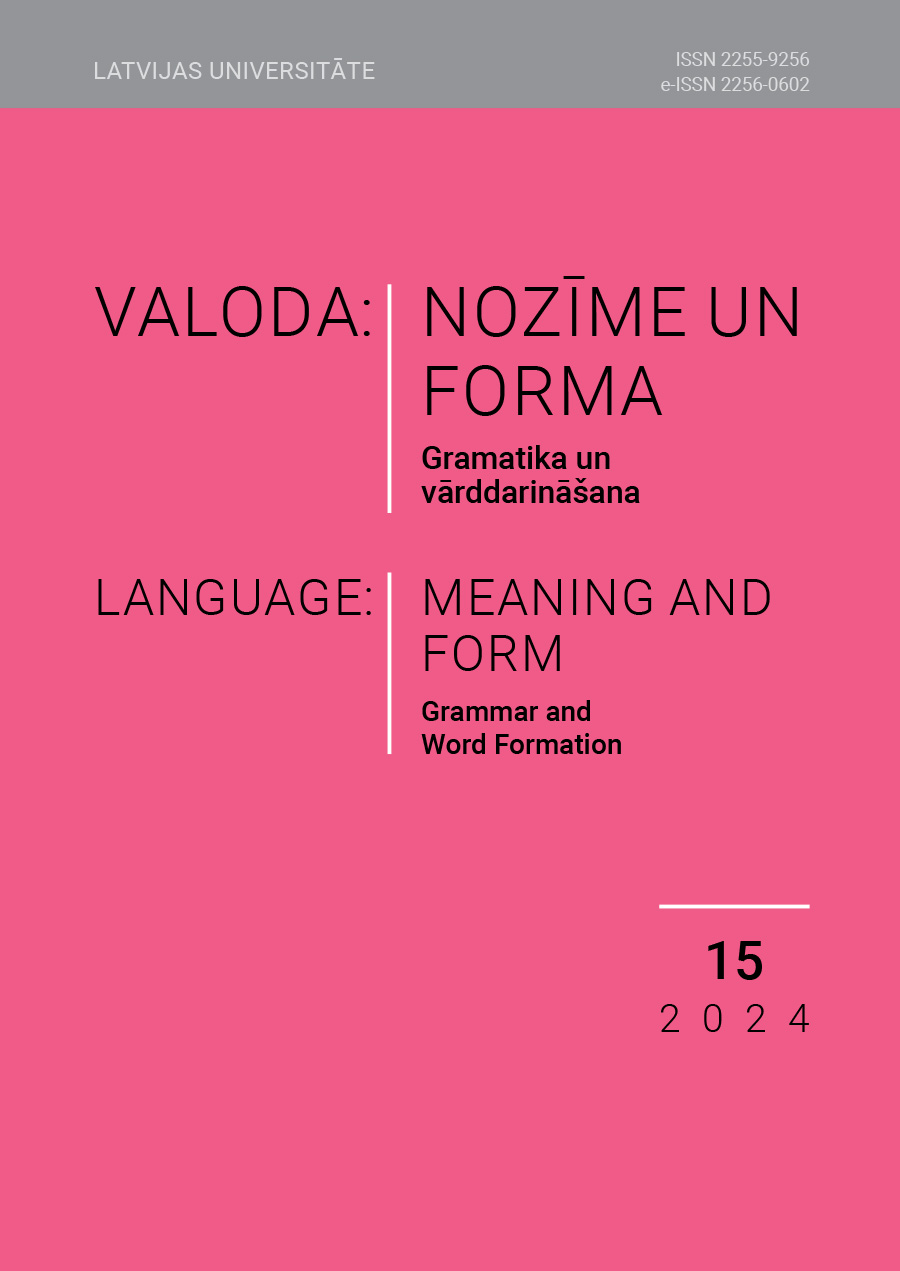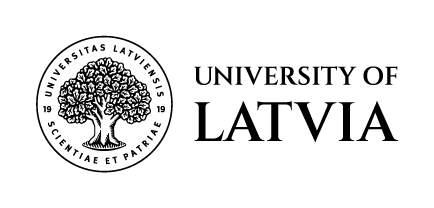Latvian reflexive and non-reflexive verbs and action nouns with paš- ‘self-’
DOI:
https://doi.org/10.22364/vnf.15.06Keywords:
word-formation, compound verb, reflexive verb, action nounAbstract
The author continues to address issues of Latvian reflexive and non-reflexive verbs compounded with paš- ‘self-’ and their action nouns. A mass media database search yielded 210 reflexive verbs and 39 non-reflexive verbs compounded with paš-, as well as 290 reflexive and 160 non-
reflexive action nouns compounded with paš-. The functionality of paš-compounded reflexive verbs and nouns is facilitated through the interaction of the reflexive and emphatic semantics delivered by both the reflexive marker and paš-. For the non-reflexive verbs and action nouns, it may convey the causative semantics “subject someone/something to the autonomous action named by the verbal base” or the exclusive semantics “by oneself”. Although verbal derivation with paš- is a peripheral phenomenon in Latvian, reflexive verbs and nouns compounded with paš- provide insights into the intersection of verbal and nominal derivations. Paš- does not function fully in verbal derivation because of the sparse distribution of compound verbs. Instead, it demonstrates activity in the nominal domain as an action noun. For 53.4 % of the reflexive action nouns and 74.3 % of the non-reflexive action nouns, corresponding reflexive and non-reflexive verbs are not attested in the mass media database, which suggests the backformation of some paš-verbs due to the paradigmatic nature of the derivation verb – action noun. Paš- demonstrates its derivational potential from the nominal domain to the verbal domain, and action nouns with -šan- can be regarded as derived via this route.
References
Bibliotēka. Available at: https://www.news.lv
Levāne-Petrova, Kristīne, Darģis, Roberts. 2018. Līdzsvarotais mūsdienu latviešu valodas tekstu korpuss (LVK2018). CLARIN-LV digitālā bibliotēka. Available at: http://hdl.handle.net/20.500.12574/11
Levāne-Petrova, Kristīne et al. 2022. Līdzsvarotais mūsdienu latviešu valodas tekstu korpuss (LVK2022). CLARIN-LV digitālā bibliotēka. Available at: http://hdl.handle.net/20.500.12574/84
Ahero, Antonija. 1967. Par citu valodu ietekmi vārdu darināšanā. Latviešu valodas kultūras jautājumi. 3, 12–20.
Ahero, Antonija et al. 1959. Mūsdienu latviešu literārās valodas gramatika. I. Rīga: LPSR Zinātņu akadēmijas izdevniecība.
Baltiņa, Maija. 1975. Deverbālo substantīvu ar -šana produktivitātes cēloņi. Latvijas PSR Zinātņu Akadēmijas Vēstis. 10, 130–135.
Bauer, Laurie. 1983. English Word Formation. Cambridge: Cambridge University Press. https://doi.org/10.1017/CBO9781139165846
Becker, Thomas. 1993. Back-formation, cross-formation, and ‘bracketing paradoxes’ in paradigmatic morphology. Yearbook of Morphology. Booij, Geert, Marle, Jaap van (eds.). Dordrecht: Kluwer, 1–25.
Freimane, Inta. 1993. Valodas kultūra teorētiskā skatījumā. Rīga: Zvaigzne.
Frīdenberga, Anna. 2016. Nominālā vārddarināšana Georga Manceļa darbos. Promocijas
darbs filoloģijas doktora grāda iegūšanai valodniecības zinātņu nozares latviešu diahroniskās valodniecības apakšnozarē. Rīga: Latvijas Universitāte. Available at:
https://dspace.lu.lv/dspace/handle/7/34339
Horiguchi, Daiki. 2023. Latvian reflexive verbs with paš- ‘self-’. Valoda: nozīme un forma. 14, 42–52. https://doi.org/10.22364/vnf.14.04
Kalnača, Andra. 2013. Darbības vārds. Latviešu valodas gramatika. Nītiņa, Daina, Grigorjevs, Juris (red.). Rīga: Latvijas Universitātes Latviešu valodas institūts, 456–594.
Kalnača, Andra. 2014. A Typological Perspective on Latvian Grammar. Warsaw/Berlin: De Gruyter Open. https://doi.org/10.2478/9783110411317
Kalnača, Andra, Lokmane, Ilze. 2010. Defective paradigms of reflexive nouns and participles in Latvian. Defective Paradigms: Missing Forms and What They Tell Us. Proceedings of the British Academy. No. 163. Baerman, Matthew, Corbett, Greville G., Brown, Dunstan (eds.). Oxford: Oxford University Press, 53–67.
Kalnača, Andra, Lokmane, Ilze. 2016. Polyfunctionality and distribution of reflexive verbs in Latvian. Baltistica. LI (1), 97–116. https://doi.org/10.15388/baltistica.51.1.2254
Kalnača, Andra, Lokmane, Ilze. 2021. Latvian Grammar. Rīga: University of Latvia Press. https://doi.org/10.22364/latgram.2021
König, Ekkehard. 2011. Reflexive nominal compounds. Studies in Language. 35(1), 112–127. https://doi.org/10.1075/sl.35.1.04koe
Mackenzie, John Lachlan. 2018. Self-prefixed verbs: analogy in the functional discourse grammar lexicon. Word Structure. 11(1), 67–94. https://doi.org/10.3366/word.2018.0116
Mackenzie, John Lachlan. 2021. Reflecting on Functional Discourse Grammar as I self-isolate. Cadernos de Linguística. 2(1), e361. https://doi.org/10.25189/2675-4916.2021.V2.N1.ID361
Nau, Nicole. 2016. Argument realization in Latvian action nominal constructions: A corpus and text based investigation. Argument Realization in Baltic. Holvoet, Axel, Nau, Nicole (eds.). Amsterdam/Philadelphia: John Benjamins Publishing Company, 461–522. https://doi.org/10.1075/vargreb.3.11nau
Soida, Emīlija. 2009. Vārddarināšana. Rīga: Latvijas Universitātes Akadēmiskais apgāds.
Stašková, Nadežda. 2013. Back-formation in the newest layer of English vocabulary. Acta Universitatis Carolinae. Philologica. 3, 31–60.
Štekauer, Pavol. 2015. Backformation. Word-formation. An International Handbook of the Languages of Europe. 1. Müller, Peter O., Ohnheiser, Ingeborg, Olsen, Susan, Rainer,
Franz (eds.). Berlin/Boston: De Gruyter Mouton. https://doi.org/10.1515/9783110246254-020
Vulāne, Anna. 2002. Par dažām vārddarināšanas problēmām. Valoda un literatūra kultūras apritē. Latvijas Universitātes Zinātniskie raksti. 650, 58–68.
Vulāne, Anna. 2013. Vārddarināšana. Latviešu valodas gramatika. Nītiņa, Daina, Grigorjevs, Juris (red.). Rīga: Latvijas Universitātes Latviešu valodas institūts, 190–299.
Downloads
Published
Issue
Section
License

This work is licensed under a Creative Commons Attribution-NoDerivatives 4.0 International License.


